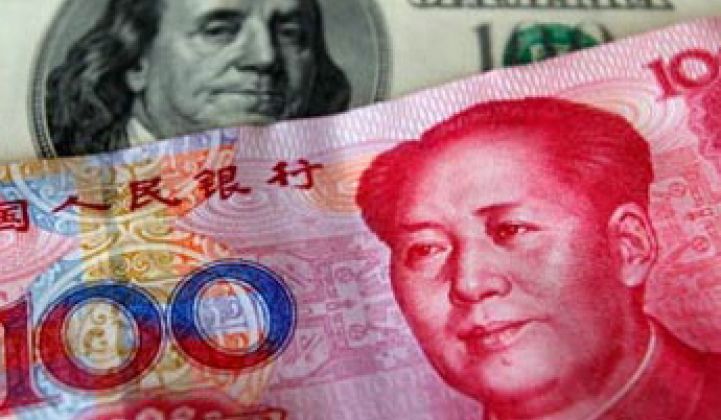According to a bulletin from CASM, The Department of Commerce "will begin collecting duties back 90 days on Chinese imports" if it finds duties are warranted.
The CASM statement said that CASM lauded "the U.S. Department of Commerce for taking expedited action against a massive, evasive surge of Chinese solar cell and panel imports ahead of Commerce’s first preliminary determination on duties, now scheduled for March 2, 2012. Commerce’s finding of 'critical circumstances' means that if the agency imposes preliminary countervailing duties on March 2, the duties will apply to all imports of cells and modules from Chinese exporters that were brought into the United States starting Dec. 3, 2011."
That might be a bit of wishful thinking of behalf of the curiously timed release from CASM. According to sources close to the case, today’s news was simply an initial indication of how the Department of Commerce will rule on March 2 in its Countervailing Duties (CVD) preliminary determination.
The bar is typically low for critical circumstance decisions and there will be no reactive application of duties unless the ITC also issues a critical circumstances determination as part of its final investigation. This will not occur until July of this year and it is rare for ITC to find critical circumstances, according to the source.
According to CASM's public relations group, Ogilvy, "This is the first time the Department has ever applied critical circumstances before a preliminary determination. This is a win for CASM and the U.S. solar manufacturing industry. Moreover, it confirms our report from last week that the Chinese were pushing product into the US market to avoid tariffs."
CASM, the SolarWorld-headed coalition has estimated that "Chinese producers have more than doubled imports of crystalline silicon solar cells and modules in advance of potential U.S. government duties on those imports, according to an evaluation of U.S. Customs and Border Protection data. The coalition alleges that the recent "110 percent surge in import volume since July 2011 is further proof of illegal dumping and subsidies by Chinese solar producers and warrants a finding of critical circumstances that would apply retroactive duties to Chinese imports."
CASM cites Suntech and Trina Solar as ranking amongst those Chinese producers.
Trina Solar has responded with these points:
- We are opposed to any suggestion that our U.S. imports surged as the result of efforts to evade potential tariffs.
- Nearly all of Trina Solar's U.S. shipments served orders tied to the federal 1603 grant expiration. We stand by our practices and the fact that they matched an increase in overall U.S. market demand.
- Further, due to production cycle and delivery logistics, it is an established industry pattern to see the majority of any quarter's shipments occurring in the last month.
Here's the text of the statement from the Department of Commerce:
In summary, in accordance with section 703(e)(1) of the Act, we find that there is a reasonable basis to believe or suspect that certain subsidy allegations under investigation are inconsistent with the SCM Agreement, and we find that there have been massive imports of solar cells over a relatively short period from Suntech, Trina, and all other producers or exporters.
Given the analysis summarized above, and described in more detail in the Preliminary Critical Circumstances Memorandum, we preliminarily determine that critical circumstances exist with respect to imports of solar cells from the PRC for Suntech, Trina, and all other producers or exporters.
According to GTM Research's Shyam Mehta, only 6 percent of the world's solar panels are made in the U.S.
***
The SolarWorld/CASM solar panel anti-dumping and countervailing duties case is still percolating at the International Trade Administration. It's a case with long-ranging implications for U.S. and Chinese solar manufacturers and the entire U.S. solar ecosystem. We've covered the case in detail and have provided perspectives from a number of angles since its initial filing on October 19 of last year.
There's not much to do other than wait, now until March 2, and in the meantime the parties will busy themselves with publishing studies and launching further public relations campaigns.
***
The decision on countervailing duties will wait for another month.
According to the Department of Commerce, "SolarWorld made a second timely request on January 19, 2012, for further postponement of the preliminary countervailing duty determination by 18 days, to March 2, 2012" and the department "has found no compelling reason to deny the request."
***
In Obama's State of the Union address last week, he announced the creation of a Trade Enforcement Unit to investigate trade issues, saying, "I will not stand by when our competitors don’t play by the rules."
***
We've contacted the International Trade Administration and asked them about the process itself, and specifically, about how and if citizens and concerned parties (other than the claimant) can make their views or evidence available. We await their response.



